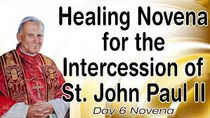The Catholic Defender: Blessed John Duns Scotus

John Duns Scotus, Franciscan Priest and Theologian of the Thirteenth Century. Next to St. Bonaventure, Bl. John is perhaps the most important and influential theologian in the history of the Franciscan Order.
A humble man, John Duns Scotus has been one of the most influential Franciscans through the centuries. Born at Duns in the county of Berwick, Scotland, John was descended from a wealthy farming family. In later years, he was identified as John Duns Scotus to indicate the land of his birth; Scotia is the Latin name for Scotland.
John received the habit of the Friars Minor at Dumfries, where his uncle Elias Duns was superior. After novitiate, John studied at Oxford and Paris and was ordained in 1291. More studies in Paris followed until 1297, when he returned to lecture at Oxford and Cambridge. Four years later, he returned to Paris to teach and complete the requirements for the doctorate.
In an age when many people adopted whole systems of thought without qualification, John pointed out the richness of the Augustinian-Franciscan tradition, appreciated the wisdom of Aquinas, Aristotle, and the Muslim philosophers—and still managed to be an independent thinker. That quality was proven in 1303, when King Philip the Fair tried to enlist the University of Paris on his side in a dispute with Pope Boniface VIII. John Duns Scotus dissented, and was given three days to leave France.
In Scotus’s time, some philosophers held that people are basically determined by forces outside themselves. Free will is an illusion, they argued. An ever-practical man, Scotus said that if he started beating someone who denied free will, the person would immediately tell him to stop. But if Scotus didn’t really have a free will, how could he stop? John had a knack for finding illustrations his students could remember!
After a short stay in Oxford, Scotus returned to Paris, where he received the doctorate in 1305. He continued teaching there and in 1307 so ably defended the Immaculate Conception of Mary that the university officially adopted his position. That same year the minister general assigned him to the Franciscan school in Cologne where John died in 1308. He is buried in the Franciscan church near the famous Cologne cathedral.
John Duns Scotus manfully defended the doctrine of Mary's Immaculate Conception…but he is not honored as either a saint or a doctor… The reason for this is that he causes theological embarrassment for some Catholics.
Scotus made important and influential contributions in metaphysics, ethics, and natural theology. Little was known of his life but he was born in Scotland, became a Franciscan monk, spent his learning and professional life at Oxford and Paris, and died in Cologne.
Drawing on the work of John Duns Scotus, Pope Pius IX solemnly defined the Immaculate Conception of Mary in 1854. John Duns Scotus, the “Subtle Doctor,” was beatified in 1993.
His order transferred him to the Franciscan house of studies at Cologne, where we know he served as lector in 1307. He died the next year; the date traditionally given is 8 November. Pope John Paul II proclaimed his beatification in 1993.
Father Charles Balic, O.F.M., the foremost 20th-century authority on Scotus, has written: “The whole of Scotus’s theology is dominated by the notion of love. The characteristic note of this love is its absolute freedom. As love becomes more perfect and intense, freedom becomes more noble and integral both in God and in man”





















Comentários